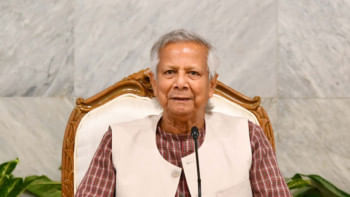President can promulgate poll related laws only during CG period
The president of the country cannot promulgate ordinances on issues other than those related to polls during the caretaker government rule, observes the High Court.
“In Bangladesh, the president's powers are limited even during the tenure of elected governments and it's more limited during the caretaker rule. The president can promulgate ordinances related to holding national elections. There's no such urgent situation in the country that the president should promulgate ordinances on other issues," the HC said yesterday.
The HC bench of Justice ABM Khairul Haque and Justice Md Abu Tariq made the observation during delivery of judgement in a writ challenging legality of an ordinance promulgated by the president to recruit kazis [official marriage registrars].
The HC declared illegal and void the Muslim Marriage and Divorce (Registration) Amendment Ordinance, 2008 which had empowered the deputy commissioners (DCs) to recruit kazis.
The court observed that the president has promulgated the ordinance beyond his constitutional jurisdiction.
Legal experts say following the HC judgement, most of the ordinances issued during the caretaker rule have now become invalid.
"This government has issued about 70 ordinances and very few of them are related to elections. If challenged, the ordinances not related to polls will be illegal," said Barrister Rafique-ul Huq.
The HC observed that the caretaker government's main duty is to hold the elections and the Council of the Advisers can request the president to promulgate election related ordinances.
"It would be better for the people of the country if the tenure of this caretaker government is shortened," the HC observed.
"The prime minister can advise the president to promulgate any ordinance for enacting any law. But the Council of Advisers can only request the president to make ordinance for making law in necessity. Considering the situation and examining related matters, the president can promulgate ordinances as per provisions of Article 93 and 58 (D) of the Constitution."
The court observed that the Supreme Court has jurisdiction to examine whether the president was satisfied with the reasons of promulgation.
"Any aggrieved citizen can seek remedy from the Supreme Court if any person holding constitutional office or any public servant violates the rules of the Constitution and the Supreme Court can consider the aggrieved person's applications," it said.
"Even the president cannot take steps against the basic structures of the Constitution."
Following the Muslim Marriage and Divorce (Registration) Amendment Ordinance, 2008 promulgation, the law ministry issued a gazette notification on the ordinance on February 20.
Six kazis including Pirjada Syed Hazee Shariatullah, kazi of Moghbazar in Dhaka and president of Bangladesh Muslim Marriage Registration and Kazi Samity, on March 13 jointly challenged the ordinance with the HC.
Following the petition, the HC issued a rule upon the government to show cause as to why the ordinance should not be declared illegal.
The government did not make any reply to the rule.
The HC appointed Barrister Rafique-ul Huq, Barrister Azmalul Hossain and Barrister AHM Shamsuddin Chowdhury as amicus curiae (friends of the court) for legal interpretation in this matter.
With references of Britain, India and Commonwealth, the legal experts made their points against the promulgation.
Advocate Kamrul Huq Siddiqi and advocate Joy Rahman appeared for the petitioners, while Deputy Attorney General Idrisur Rahman Khan stood for the government.

 For all latest news, follow The Daily Star's Google News channel.
For all latest news, follow The Daily Star's Google News channel. 



Comments